Quebec doctor group still calling for open and honest dialogue with health authorities
by Dan Fournier, published Thursday, Nov. 17, 11:37 EST on fournier.substack.com
Public gathering held on Nov. 4, 2022 next to the Montreal office of the Collège des médecins du Québec (CMQ) organized by Réinfo Covid Québec against the vaccination of children. The speaker on the right in the grey suit is M. Bernard Massie (PhD in microbiology U. of M, and former Senior Manager of Human Health Therapeutic Area at the National Research Council Canada). A participant holds a green-framed cardboard sign written “NOS ENFANTS NE SONT PAS DES COBAYES” (English: “OUR CHILDREN ARE NOT GUINEA PIGS”), Photo courtesy of Christian Leray, Réinfo Covid Québec.
This is a follow up news article to Quebec doctor group asking health officials to be truthful & complete about Covid-19 mRNA-based vaccinations published on Oct. 31, 2022.
Author and publication note: Let it be clearly stated that this is not an opinion article but rather a news article. The aim of this article is to report accurate information, along with comments and statements given by the concerned parties who had the opportunity to share them. It is intended to inform, without prejudice, the general public of the events surrounding the open letter from the group of doctors and others from Réinfo Covid Québec. This independent author has no affiliation or personal interests with any of the parties stated in this article. The author has no desire or intention to enter into any scientific discussion on health matters related to the contents of the open letter, for that it is not his area of expertise. Though the author may hold personal views regarding the topics covered herein (as does any individual), they are implicitly and explicitly excluded from this reporting.
Video screenshot from the public gathering on Nov. 4, 2022. A woman holds a Réinfo Covid Québec sign while another holds one stating “LIBRE EXPRESSION SCIENTIFIQUE DISCOURSE OUVERT CONSENTEMENT ÉCLAIRÉ PROTECTION DES ENFANTS” (English: “FREE SPEECH SCIENTIFIC EXPRESSION OPEN DISCOURSE INFORMED CONSENT CHILD PROTECTION”), Source: YouTube
As a refresher, 19 signatories and members of Réinfo Covid Québec, an arm of an international collective of 4,000 doctors and 80,000 members, had sent an open letter on October 19, 2022, to the heads of three health authorities in the province, namely to the Collège des médecins (College of Physicians), the Institut national de santé publique du Québec (INSPQ) (the Quebec Public Health Authority), and L'Association des pédiatres du Québec (the Quebec association of pediatricians).
The very detailed, and cited, letter outlines their concerns surrounding the availability and completeness of information related to the mRNA vaccine to ensure clear and informed consent for parents who decide whether or not to vaccinate their children during the Covid-19 pandemic.
The letter also contends that the media has presented misinformation as truth and have stigmatised those who question the experimental vaccine as “anti-vax”.
In addition, the letter also seeks a more open exchange and support from the aforementioned public health institutions, among other points of interest.
Speaking out
“The role of the Collège des médecins is to protect the population. So, it's a professional order, and they protect the population by also monitoring the practice of medicine by doctors in Quebec,” stated Dr. Lavigueur, one of the co-signers of the open letter, at the November 4th public gathering.
“For us, the point on which we insist is the vaccination of children which has no scientific basis,” he continued.
Dr. Lavigueur has been one of the most outspoken and criticized doctors surrounding the open letter.
At the gathering he continued (again, translated from French), “The vaccine is not a vaccine like the others, [it] must not be seen by the population as a vaccine like everyone knows. So those who call us anti-vax are wrong. We are not talking about that, we are talking about messenger RNA which is an entirely new technology and which has been put forward a little falsely as under the label of a vaccine, which it is not. So, the goal is to say [it] is necessary that the population know the truth; it is our ethical duty as doctors to ensure...It is the duty of the Collège des médecins to ensure that parents who sign their child's vaccination authorization on their behalf have all the information available.”
“The [open] letter we published to the Collège [des médecins], ..., it's wrong to say it [the mRNA vaccine] is safe and effective. It's misleading advertising. And we're asking the College to put science back to that, to ensure that the official media tells the truth so that parents can make an informed decision,” concluded Dr. Lavigueur in his public statement.
Update from Réinfo Covid Québec
According to Christian Leray, a spokesperson for the Réinfo Covid collective, of the three health authorities to whom the open letter was addressed, only the CMQ had responded to their open letter.
Separate from the open letter, they had contacted the CMQ proposing an open and respectful exchange on the matter. But, unfortunately, stated M. Leray, their response was evasive and they were guarded to issue any public reaction on the matter. Instead, they “contented themselves to publishing a tweet containing an article that appeared in the Journal de Montréal”, affirmed the spokesperson.
The tweet M. Leray is referring to is the following one from October 29, 2022:
October 29, 2022 tweet from the official Collège des médecins du Québec (CMQ) Twitter account. English translation: “The College is vigilant of any misinformation that could mislead the public and invites the public to bring these situations to our attention #covid-19”
The linked article for the tweet indeed points to an article written the day prior from the Journal de Montréal with a title of COVID-19: des médecins contre la vaccination des enfants sous la loupe (English: “COVID-19: Doctors against child vaccination under scrutiny”) with a byline of “19 médecins et scientifiques réclament à tort l’interdiction de vacciner les jeunes” (English: “19 doctors and scientists wrongly call for a ban on vaccinating young people.”)
The tweet itself garnered irate responses; the majority being negatively slanted against the provincial health regulator.
What stands out from the Journal de Montréal article are retorts by two doctors.
One is named Elie Haddad, a professor at the pediatrics department at the University of Montreal and researcher from the CHU Sainte-Justine who appeared in a short accompanying video stating the following:
«Tout ce qui a été écrit dans cette lettre est juste un ramassis d'inepties. Je ne trouve pas d'autres mots pour la décrire»
English translation: “Everything written in this letter is just a bunch of nonsense. I can't find any other words to describe it.”
Yet, no specific or supporting statements are provided by professor Haddad to accompany his assertion.
This author has contacted Dr. Haddad and his Director, Jacques Thibodeau from the microbiology department at the University of Montreal for their comments on the matter, but neither have responded as of publishing time.
The other doctor, who goes by the nickname «médecin de TikTok» (English: The Tik Tok Doc), is Dr. Mathieu Nadeau-Vallée, a resident doctor also at the University of Montreal.
Dr. Nadeau-Vallée has been very outspoken on social media, combatting misinformation about Covid-19.
What is particularly noteworthy is that his employer, the University of Montreal, appears to endorse his online activities. For, they have published a curated news piece entitled Mathieu Nadeau-Vallée: Fighting disinformation among young and old on TikTok and Twitter which does appear to imply that the University of Montreal is endorsing Dr. Nadeau-Vallée’s actions and affirmations on social media.
University of Montreal curated news in English, Mathieu Nadeau-Vallée: Fighting disinformation among young and old on TikTok and Twitter, 03/04/2022, source: UDEMNOUVELLES https://nouvelles.umontreal.ca/en/article/2022/03/04/mathieu-nadeau-vallee-fighting-disinformation-among-young-and-old-on-tiktok-and-twitter/
From the Journal de Montréal article, Dr. Nadeau-Vallée stated:
« Ce qui est important à dire, c’est que la lettre est un ramassis de bêtises et de fausses informations. C’est très mal sourcé aussi. La plupart des références viennent de vidéos YouTube ou de sites Internet d’extrême droite. Très peu de références sont scientifiques.»
English translation: “What is important to say is that the letter is a bunch of nonsense and false information. It's very poorly sourced too. Most of the references come from YouTube videos or far-right websites. Very few references are scientific.”
Moreover, in the video from the article, Dr. Nadeau-Vallée affirms the following points:
[talking about the open letter:] « C’est un ramassi de fouteses. » (Google-translated English: “It's a bunch of bullshit.”)
« Premièrement, les vaccins Covid ne sont pas expérimentaux. » (English: “First, Covid vaccines are not experimental.”)
« Ils [les vaccins] ont passer à travers de toutes les phases cliniques. » (English: “They [the vaccines] have gone through all the clinical phases.”)
« Ensuite, les études animals completes on tete réalisées. » (English: “Then, the complete animal studies were carried out.”)
There certainly exists contention and debate with regards to the last three points the resident doctor has stated from above.
In the University of Montreal curated news, a Q&A section appears below the main article in which Dr. Nadeau-Vallée is asked several questions about his strategy for countering disinformation on social media (which can indeed be quite polarizing, to say the least). One of these questions goes “What is your strategy to avoid getting drawn into quarrels?” to which the young resident responds:
“I try to stay calm and neutral, to always support my comments with the scientific literature and cite my sources, and to remain cordial. I block disrespectful or malicious users. I also use humour to lighten the mood.”
Unfortunately, though, his retort in the Journal de Montreal article provides no such mentions of supporting scientific literature, nor does he cite or state any specific sources regarding his assertions.
This author has contacted the University of Montreal’s press agent, Mr. Jeff Heinrich for comment, yet no reply has been received as of publishing time.
The Journal de Montréal also stated that the Collège des médecins du Québec had brought the case to the attention of the direction of the investigations of the syndic of the order which M. Leray from Réinfo Covid Québec confirmed to be true.
In addition, the article mentioned that the minister from the Santé et des Services sociaux (MSSS) recalled that the Comité sur l’immunisation du Québec (CIQ) had given a favorable opinion on the vaccination of children from six months to five years old this past summer; and that a small number of doctors had signed the [open] letter, in comparison to the total number of doctors. “We don't believe we have to go any further with this one”, declared Marjorie Larouche, a spokesperson for MSSS.
The spokesperson for Réinfo Covid Québec added that they strongly doubt that either of the three health authorities will accept a meeting (not a debate). But they remained encouraged by the turnout and support of those who attended their November 4th & 5th gatherings.
“We often receive strong message of support,” added M. Leray, concluding with “It is true that we are one of the few organizations to have a dissenting voice when it comes to health measures.”
Patrick Provost at odds with his employer and the CMQ
The first comment displayed from the aforementioned CMQ tweet comes from one of the 19 signatories of the open letter – Patrick Provost, a biochemistry researcher and professor at the Department of Microbiology, Infectiology and Immunology at Laval University, in which he states:
« Avez-vous pris connaissance de la lettre ou tenté de répondre aux questions qui y sont soulevés? Qu'attendez-vous pour convoquer les 19 signataires médecins et scientifiques à une rencontre pour en discuter? La science et la protection du public d'abord. »
English translation: “Have you read the letter or attempted to answer the questions raised in it? What are you waiting for to invite the 19 signatories, doctors and scientists, to a meeting to discuss it? Science and public protection first.”
On the 28th of October, Libre Média, a Quebec-based independent news outlet, published Patrick Provost risque à nouveau la suspension (English: Patrick Provost risks suspension again). In a letter which Libre Média obtained, Patrick Provost was categorical:
« L'Université Laval et son représentant André Darveau [le vice-recteur exécutif, ndlr] persistent à vouloir interdire les débats et les discussions, autant entre professeurs qu'entre professeur et membre de la communauté, en préconisant l'antagonisation des personnes qui ont des divergences d'opinions, créant ainsi une victime et un coupable à punir. »
English: “Université Laval and its representative André Darveau [the executive vice-rector, editor's note] persist in wanting to prohibit debates and discussions, both between professors and between professor and member of the community, by advocating the antagonism of people who have differences of opinion, thus creating a victim and a culprit to be punished.”
This admission by Provost emanated from a reaction by his employer following a complaint received by an individual who had heard him criticise vaccinations on the airwaves of Radio X.
“I asked them to arrange a meeting with the complainants (in the presence of third parties and the media) so that I could explain my point of view to them, present to them the data and the scientific articles on which I based what I said and, above all, to answer their questions to the best of my knowledge,” affirmed Provost.
For it, Provost faces a six-month suspension without pay by his employer.
The article continued:
La liberté académique en peril
Pour le chercheur de renommée internationale, « la direction de l'Université Laval continue donc de bafouer la loi 32 sur la protection de la liberté académique en milieu universitaire, qui est en vigueur au Québec depuis le 7 juin 2022 ».
English: Academic freedom at risk
For the internationally renowned researcher, “the management of Université Laval therefore continues to flout Law 32 on the protection of academic freedom in the university environment, which has been in force in Quebec since June 7, 2022”.
“Laval University is relentless in wanting to silence me and make an example of me, in what I equate to harassment, discrimination based on my (scientific) opinion and intimidation,” defended Provost.
To have his voice heard, Patrick Provost published the following article in the independent media outlet:
Le véritable portrait de la Covid-19 au Québec, 2022-06-24 (English: The true portrait of Covid-19 in Quebec), note: originally published in the Journal de Montréal and in TVA Nouvelles but later retracted.
And he also shared his thoughts in the following one:
Étudier les «anti-vax», une commande politique selon Patrick Provost, 2022-10-24 (English: Studying “anti-vax”, a political order according to Patrick Provost)
In the second article, Provost makes reference to a research study about vaccine hesitancy undertaken by Laval University for which he exclaims: “it is less about conducting scientific research than defending government policy.”
The Laval research study in question secured C$1.1 million in financing from the Canadian Institutes of Health Research (CIHR).
This author has reached out to Patrick Provost for comment and here is what the professor in the Department of Microbiology, Infectiology and Immunology at Laval University had to share.
As of November 15, Patrick Provost is still in employment as a full professor at Laval University.
He still hasn’t received any explanation about the complaint filed towards him as mentioned above, nor an opportunity to meet with its plaintiff(s).
Regarding another similar complaint filed against him which could lead to a six-month suspension without salary or an outright suspension, Provost affirms that it is still pending and an announcement is expected by Christmas.
With regards to defending his workplace rights against harassment, Provost says that he has filed two grievances with representatives and is awaiting information about them.
When asked about whether he has the freedom to exercise his work-related functions independently without prescribed measures imposed by his employer, he replied (translated from French): “I must be able to exercise my academic freedom outside of any doctrinal constraints, what I do and what I am harassed for and hunted down like a witch, while Law 32 guarantees academic freedom in academia which has been in effect since June 7, 2022 and my collective agreement should protect me.”
Provost, who is very vocal on his Facebook page, posted the following image which made reference to a text regarding the protection and enhancement of freedom of expression at Laval University:
Through the largest social media platform in the world, Facebook, the outspoken professor also likes to express himself through personal quotes such as:
English: “Truth emerges through the confrontation of ideas; the truth that cannot be confronted is not.”
And,
English: “Consensus achieved by silencing all criticism is not consensus, it is propaganda.”
When asked about whether conflicts of interest (with pharmaceutical companies) exist at Laval University, Provost exclaimed the following (author note: with permission):
« La présence de conflits d'intérêts est omniprésente dans notre société, et celle impliquant les compagnies pharmaceutiques, qui exercent une grande influence sur nos gouvernements, est assez évidente depuis deux ans. L'Université Laval ne fait pas exception. Elle reçoit d'importantes sommes des compagnies pharmaceutiques qui bénéficient de la crise actuelle, entre autres, par le biais de sa Fondation (même chose pour Huawei et la 5G). L'information a été retiré de leur site Web peu après qu'elle eut circulé sur les réseaux sociaux. Les professeurs d'université n'osent pas s'exprimer par crainte de représailles. Certains possèdent des subventions de recherche sur la COVID-19 ou les vaccins, et n'ont donc pas intérêt à ce que la crise s'estompe ou que les vaccins soient déconseillés ou refusés par la population. D'ailleurs, la dernière annonce de l'Université Laval faisait état d'une Chaire de recherche sur l'hésitation vaccinale, comme quoi, pour l'Université Laval, il importe de faire accepter ces injections plutôt que de s'interroger sur leurs effets secondaires bien réels. »
English (Google translated): “The presence of conflicts of interest is omnipresent in our society, and that involving the pharmaceutical companies, which exert a great influence on our governments, has been quite evident for two years. Laval University is no exception. It receives large sums from pharmaceutical companies that benefit from the current crisis, among others, through its Foundation (same for Huawei and 5G). The information was removed from their website shortly after it circulated on social media. University professors dare not speak out for fear of reprisals. Some have research grants on COVID-19 or vaccines, and therefore have no interest in seeing the crisis fade or that vaccines are advised against or refused by the population. Moreover, the latest announcement from Université Laval mentioned a research chair on vaccine hesitancy, as what, for Université Laval, it is important to have these injections accepted rather than questioning their very real side effects.”
Finally, when asked who has supported him most in his recent ordeals, he replied that hundreds of scientific experts from the Canadian Covid Care Alliance and Réinfo COVID Québec did so, along with thousands of other like-minded scientific experts from around the world.
The University of Laval has yet to respond following a request for comments on Patrick Provost’s public statements.
Conflicts of interests
The apparent conflicts of interests, as cited by Patrick Provost at Laval University, leads to the broader question of whether a large portion of universities in Quebec (and in other Canadian provinces, for that matter) operate in such a fashion as a norm, rather than the exception. Such allegations are not always easily verifiable due to a number of factors.
But where they do exist, greater transparency towards the general public is a must; for, without it, trust in public institutions – healthcare-related or otherwise – will deteriorate and erode confidence amongst the greater population.
With regards to the topic at hand, three types of conflict of interests are in contention: corporate, institutional, and those relating to media coverage.
In a news article from Libre Média dated October 21, 2022, «Propagande sanitariste»: 1,1 million pour étudier les «anti-vax» (English: “Health crisis propaganda”: 1.1 million to study “anti-vax”), institutional conflicts of interests were raised. Laval University had just inaugurated a research chair whose goal is to study the vaccine hesitancy. The institution ensures that the financing of the center is entirely public. It is the first of its kind in Canada, headed by led by anthropologist Ève Dubé of the National Institute of Public Health of Quebec (INSPQ) – one of the three health authorities the open letter was addressed to.
In a related article, Patrick Provost weighed in saying that it [the research study] is less about conducting scientific research than defending government policy; the article states:
« Le fait que la chaire soit le fruit d’un partenariat entre l’Université Laval et l’INSPQ prouve selon lui son caractère politique. Il rappelle aussi que l’IRSC, qui assurera le financement, n’est pas lui-même totalement dépourvu de financement provenant de géants pharmaceutiques. »
English: “The fact that the chair is the result of a partnership between Laval University and the INSPQ proves, in his view, its political nature. He also recalls that the CIHR (Canadian Institutes of Health Research), which will provide the funding, is not itself completely devoid of funding from pharmaceutical giants.”
And,
«L’INSPQ n’est pas indépendant scientifiquement. Des gens qui y travaillent peuvent mener des travaux objectifs, mais la direction reste soumise au ministère de la Santé et des Services sociaux. L’INSPQ a souvent servi à donner un imprimatur scientifique à des décisions politiques»
English: “[The] INSPQ is not scientifically independent. People who work there can carry out objective work, but the executive remains subject to the [Quebec] Ministry of Health and Social Services. The INSPQ has often served to give a scientific imprimatur to political decisions.”
This author has reached out to the INSPQ for comment, but they have stated that they prefer not to comment on the open letter, nor on the situation.
In an opinion article from Libre Média from this past August titled Chaire Pfizer: Cécile Tremblay est-elle en conflit d’intérêts?, the issue of conflicts of interest was brought up. The article began:
« La crise sanitaire a été une occasion en or pour des chercheurs: attirer des fonds publics dispensés par les gouvernements, mais aussi par des géants pharmaceutiques. »
English: “The health crisis has been a golden opportunity for researchers: to attract public funds provided by governments, but also by pharmaceutical giants.”
The article then stated that many readers had reacted strongly following the announcement that the syndic (Syndic du Collège des médecins) did not see any conflicts of interest with regards to Dr. Cécile Tremblay.
The original contention of this case was referenced in a separate news article which outlined the disputed risks of conflict of interest given that Dr. Cécile Tremblay, microbiologist-infectiologist at the CHUM, was also the research Chair for Pfizer at the University of Montreal.
In this particular case, the assistant-syndic overseeing the complaint said that opening an investigation was never considered since there wasn’t any apparent indication of ethics breaches on the part of Dr. Tremblay and that no conflict of interest was provided by the complainant.
Screenshot from Libre Media’s August 18, 2022 opinion article
This decision by the assistant-syndic caused an uproar by readers of Libre Média.
Moreover, Francis Etheridge, had filed a formal complaint to Radio-Canada (the French version of the CBC) alleging that since Dr. Tremblay was Chair for Pfizer [at the University of Montreal] and that this fact was not disclosed while she was as a guest on Le telejournal, a news show on the network, it was a conflict of interest; particularly, because he deemed the network to be “selective” about the type medical professionals invited as guests on the show, i.e., presuming M. Etheridge meant they were mostly one-sided.
In his complaint, Mr. Etheridge asserted:
« Je considère que ceci contrevient à votre engagement, tel qu'exposé par la description de vos normes et pratiques journalistiques, à mettre "tout en œuvre pour dévoiler l’identité des intervenants et donner le contexte et les explications nécessaires qui permettent à l’auditoire de juger de la pertinence et de la crédibilité de leurs propos.” »
English: “I consider that this contravenes your commitment, as set out in the description of your journalistic standards and practices, to make "every effort to reveal the identity of the speakers and to provide the necessary context and explanations which allow the audience to judge the relevance and credibility of their remarks.””
In the end, the ombudsman for Radio-Canada overseeing the complaint absolved Dr. Tremblay of any wrongdoing since her work as the Chair is financed by the investment income generated by the [Pfizer] donation and that she personally derived no income from it; also concluding that Dr. Tremblay’s appearance on the show respected its journalistic norms and practices.
Commenting on the Dr. Tremblay Chair situation, M. Leray from Réinfo Covid Québec said:
« Les chercheurs savent que l’argent qui les finance vient des labos et du gouvernement. Donc déjà en partant, très peu iront contre le discours dominant. »
English: “Researchers know that the money that funds them comes from labs and the government. So already from the start, very few will go against the dominant discourse.”
Further adding:
« Ceux qui le font savent qu’ils mettent leur carrière en péril, c’est pourquoi la plupart sont à la retraite ou en fin de carrière. Aucun jeune ne peut se permettre de parler.»
English: “Those who do know they are putting their careers at risk, which is why most are retired or at the end of their careers. No young person can afford to talk.”
And:
« C’est comme cela qu’ils obtiennent un « consensus scientifique » »
English: “This is how they get “scientific consensus””
Leray mentions that it is well known that pharmaceutical companies offer many gifts to doctors in order to prescribe their drugs; it can also be done indirectly with an invitation to an all-expenses-paid symposium.
And, that events such as the 2022 Hippocrate gala, which was just recently held at the end of October, demonstrates the symbiotic relationship that exists between the pharmaceutical industry and doctors.
The Hippocrate gala, which has a mission to celebrate innovation in interdisciplinary health in Quebec, awards prizes to medical practitioners in the province.
This year’s ceremony took place under the honorary presidency of Mr. Michal Juul Sorenson, Vice-President and Chief Executive Officer of Lundbeck Canada, and Dr. Luc Boileau, Assistant Deputy Minister and National Director of Public Health for Quebec.
Lundbeck is a Danish international pharmaceutical company with offices around the world.
It’s also worth noting that Dr. Luc Boileau was one of the three people to whom the open letter Réinfo Covid Québec was addressed.
Last year’s gala was presided by Cole Pinnow, the President of Pfizer Canada.
Screenshot of the home page of the 2022 edition of the Hippocrate gala.
Partners for this year’s gala include some notable pharmaceutical giants such as Lundbeck, GlaxoSmithKline, and Pfizer, among others.
While there is no evidence that any of these partners fund the gala and its prizes, it is not entirely transparent as to why they are categorized into four groups: platinum, gold, silver, and bronze.
This author has reached out to the organisers of the gala for clarification on their respective roles, but has not received a reply as of publishing time.
Media bias, censorship, and transparency
“To be opposed to freedom of expression, for any reason whatsoever, represents the front door to totalitarianism,” expounded M. Leray from Réinfo Covid Québec.
It is no secret that media bias and suppression has run amok recent years. And this is particularly the case with information and news surrounding the Covid-19 global pandemic.
Copious amounts of disinformation and misinformation as well as propaganda exist on all sides of any particular topic or issue of contention.
The Covid-19 pandemic has been center-stage to this phenomenon right from the start. Whom to believe or not believe remains a monumental challenge, even for the ultra-informed and well-read.
With any topic or issue of contention, as in science, it is preferable to have an open forum whereby all sides can present their cases with accompanying arguments and supporting materials. Without such an open and transparent forum, true discourse, reason, and progress will seldom manifest.
Returning to the topic at hand for this article, the mainstream media and press have, for the most part, presented a one-sided account with regards to what is permissible and what is taboo about Covid-19; and, in particular, the broader measures imposed by various authorities, and treatments, including medical protocols and vaccines.
Apart from opinion pieces, rarely do we find news articles that go against government and health agencies narratives. This is quite apparent with the Covid-19 vaccines. They have mostly been portrayed as being “safe and effective” and posing minimal risks.
Medical practitioners or even politicians who speak out in defiance of these prevailing narratives are often ostracised, ridiculed, labelled conspiracy theorists, or outright censored. Even in non-opinion pieces, there are plenty of occurences that attests to this trend.
In line with what M. Leray from Réinfo Covid Québec contends, shutting one side out of a debate or discourse can lead to a false consensus by which society will be deprived of completeness of information for better decision making.
And that is what the main contention in their open letter is about; namely, so that parents can have complete information to make proper decisions on whether or not to vaccinate their children against Covid-19.
It doesn’t matter what side of any given debate one falls on. What matters is to have a respectful open, honest, and transparent forum by which all individuals can express themselves freely. Those are the hallmarks of a healthy and vibrant democracy.
The question many are asking is: why is the mainstream media so adamant at suppressing information that goes against official narratives?
According to the doctors and professionals from Réinfo Covid Québec, a lot of such suppression and censorship has indeed occurred.
Last year, Dr. Lavigueur, one of the signatories of the open letter, had an article published on October 26, 2021, in the journal La Presse titled Les dilemmes d’un médecin de famille en temps de Covid. But after some backlash, La Presse swiftly removed the article from its website with its editor, Stéphanie Grammond, offering a clarification on the issue. She contended that her publication had no room for disinformation and that “science comes first” (La science d’abord).
It remains to be seen why they had approved and published the piece in the first place, and what events lead to its withdrawal.
On the same day, La Presse put out a retort, albeit an opinion piece, against Dr. Lavigueur titled Des faussetés et des demi-vérités à corriger (English: Falsehoods and half-truths to correct). The article is very similar in nature to the one which appeared in the Journal de Montréal article as stated above. To wit, in this case they made use of the services of Dr. Alex Carignan, a doctor and researcher from the University of Sherbrooke, to counter the claims of Dr. Lavigueur.
As touched upon earlier, another trend that exists in media is the weaponization of words such as ‘conspiracy theorist’ and ‘right-wing’ to label dissenters or those of opposing views to the mainstream narratives. While there is room for these in opinion pieces, too often news outlets use them in their news reporting, as previously documented.
And this has the (intended, or unintended) effect of suggesting to readers that the information presented is factual and of confirmed nature which can mislead, as is the case with disinformation.
Given its inherent scientific complexities, nuances, interpretations, politicizations and other influences, publishing accurate health-related information – especially related to Covid-19 – remains a major challenge for any news outlet.
Journalists and editors may not be adequately versed in such matters, making editorial and publishing decisions difficult.
A pertinent example that illustrates this is that of journalist Francine Pelletier from the Le Devoir who was ousted for a piece she wrote (La pandémie revue et corrigée) earlier this year. The editor-in-chief of the daily publication, Marie-Andrée Chouinard, also resorted to a “corrective” article to alleviate the situation.
Most major media outlets today have integrated comments sections whereby the greater public can add their thoughts to the mix, which can add even further complexity and controversy. The benefit, however, is an increase in the chance for much-needed critical discernment and discourse.
Public discourse
Events surrounding the Covid-19 Pandemic over the past few years have created a lot of confusion, anger, divisiveness, and sadness. It has also created considerable amounts of conflicts at nearly all levels of society.
Throughout history, free and open dialogue and discourse have proved beneficial to the advancement of society.
In this light, I encourage and invite all parties mentioned in this article as well as members of the greater public to get involved in this much needed discussion.
All that is required to do so, is to post your thoughts in the comments section below; this site, Substack, may ask you to create a profile or account which is entirely free.
RULES: If you do comment, please be respectful of others. You can write in English or French. You can post them anonymously or using your real name (and title, if applicable). No comments will be removed or censored unless they are deemed unlawful, or contain defamatory, abusive, or hateful language. Try to be constructive rather than just critical.
You are also invited to subscribe to my Substack Newsletter by entering your email address and clicking the “Subscribe” button.
Lastly, to further expand the discussion, feel free to share this article on Twitter or Facebook by using the links below.
Addendum 2023-02-21 (Patrick Provost):
There is an update regarding the case of Patrick Provost from Laval University. He sent an email updating his situation which is Google translated in part below followed by the original French.
English Translation:
On Friday, January 6, 2023, Vice-rector at the VRHF of Laval University, Mr. André Darveau, announced that they had deemed admissible another complaint filed against me (see 230106_Avis_Plainte). It is a copy-pacored of the procedures undertaken against me which led to a first suspension of 8 weeks without salary last summer, from June 14 to August 9, 2022, then to a second suspension of 4 months without salary , from January 23 to May 23, 2023, which I am currently serving and which was announced publicly on February 2, 2023.
At the end of the letter informing me of my last suspension, the Laval University mentioned "that any recurrence on your part will lead to a dismissal" (see 230203_decision_patrick_provost end of the letter). The complaint of January 6, 2023 must therefore logically lead to my dismissal.
However, on February 14, 2023, and against all odds, the complaint was abandoned by Laval University (see 230214_decision). This decision occurred the next day that they received a letter signed by 280 professors' colleagues from Laval University who support me (see 230216 280 teachers), in what many qualify as a decline from Laval University.
- February 14, 2023: Laval University informs me that it drops the complaint and that, unlike the two previous complaints, an investigation committee will not be set up (see 230214_decision)
Original French:
Le vendredi 6 janvier 2023, le vice-recteur aux VRRHF de l’Université Laval, Monsieur André Darveau, m’a annoncé qu’ils avaient jugé recevable une autre plainte déposée contre moi (voir 230106_Avis_plainte). Il s’agit d’un copié-collé des procédures entreprises contre moi qui ont mené à une première suspension de 8 semaines sans salaire l’été dernier, du 14 juin au 9 août 2022, puis à une deuxième suspension de 4 mois sans salaire, du 23 janvier au 23 mai 2023, que je purge actuellement et qui a été annoncé publiquement le 2 février 2023.
À la fin de la lettre m’informant de ma dernière suspension, l’Université Laval mentionnait « que toute récidive de votre part entraînera un congédiement » (voir 230203_Decision_Patrick_Provost Fin de la lettre). La plainte du 6 janvier 2023 devait donc logiquement mener à mon congédiement.
Or, le 14 février 2023, et contre toute attente, la plainte a été abandonnée par l’Université Laval (voir 230214_Decision). Cette décision est survenue le lendemain qu’ils aient reçu une lettre signée par 280 collègues professeurs de l’Université Laval qui m’appuient (voir 230216 280 profs), dans ce que plusieurs qualifient de recul de l’Université Laval.
- 14 février 2023: L’Université Laval m’informe qu’elle laisse tomber la plainte et que, contrairement aux deux plaintes précédentes, un comité d’enquête ne sera pas mis sur pied (voir 230214_Decision)
Disclaimer:
None of the contents of this article is to be taken as medical or health-related advice. Seek independent professional consultation before making health-related decisions. The author has no relation and affiliation with Réinfo Covid Québec, nor should this article be taken as an endorsement. See the author’s About page for full disclaimer.
Notes:
An abridged version of this article is also published in The Counter Signal and tweeted by their editor-in-chief Keean Bexte.
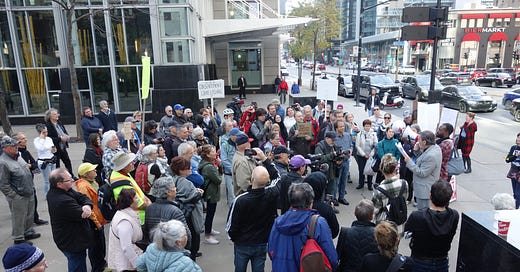



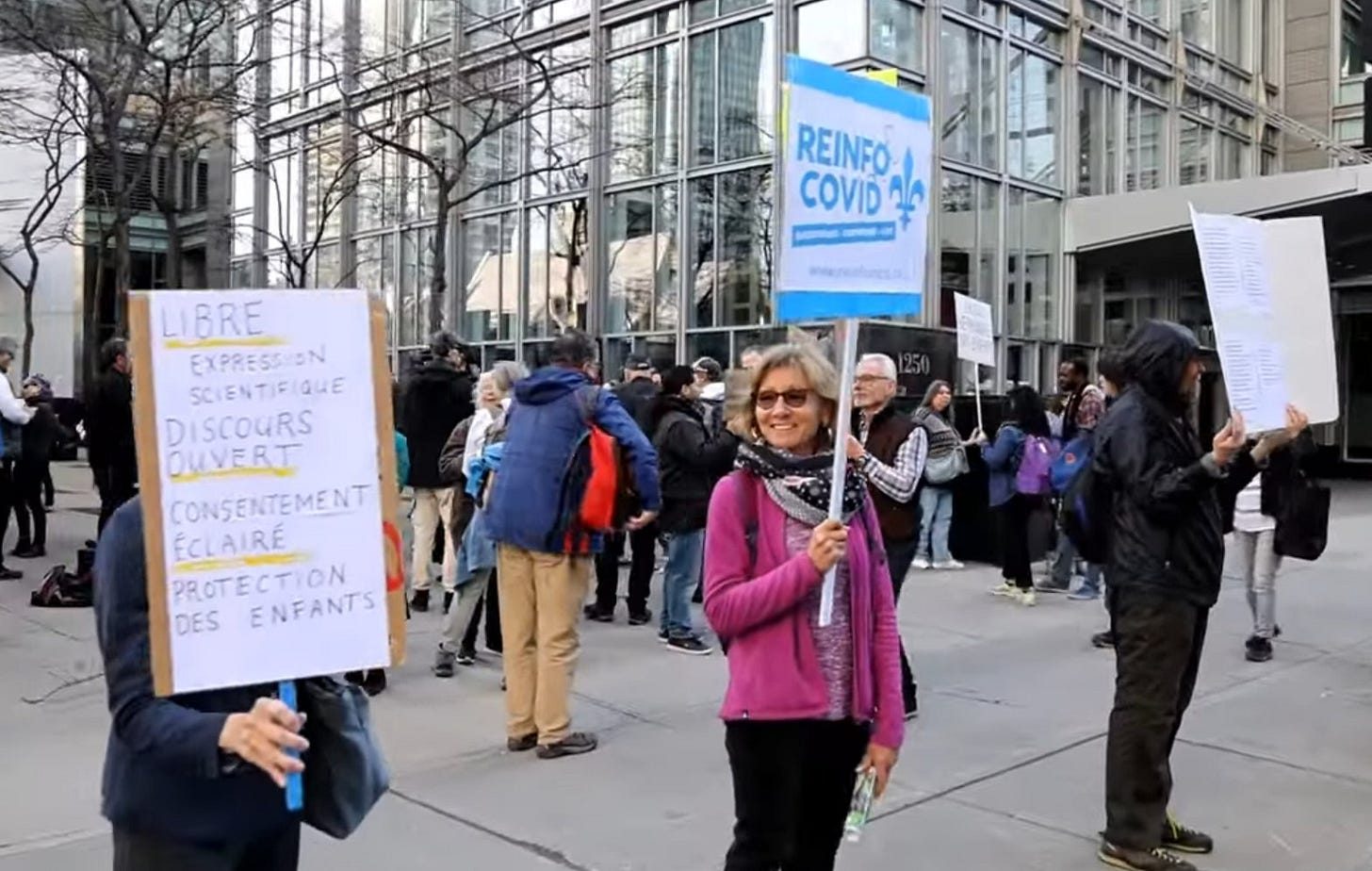
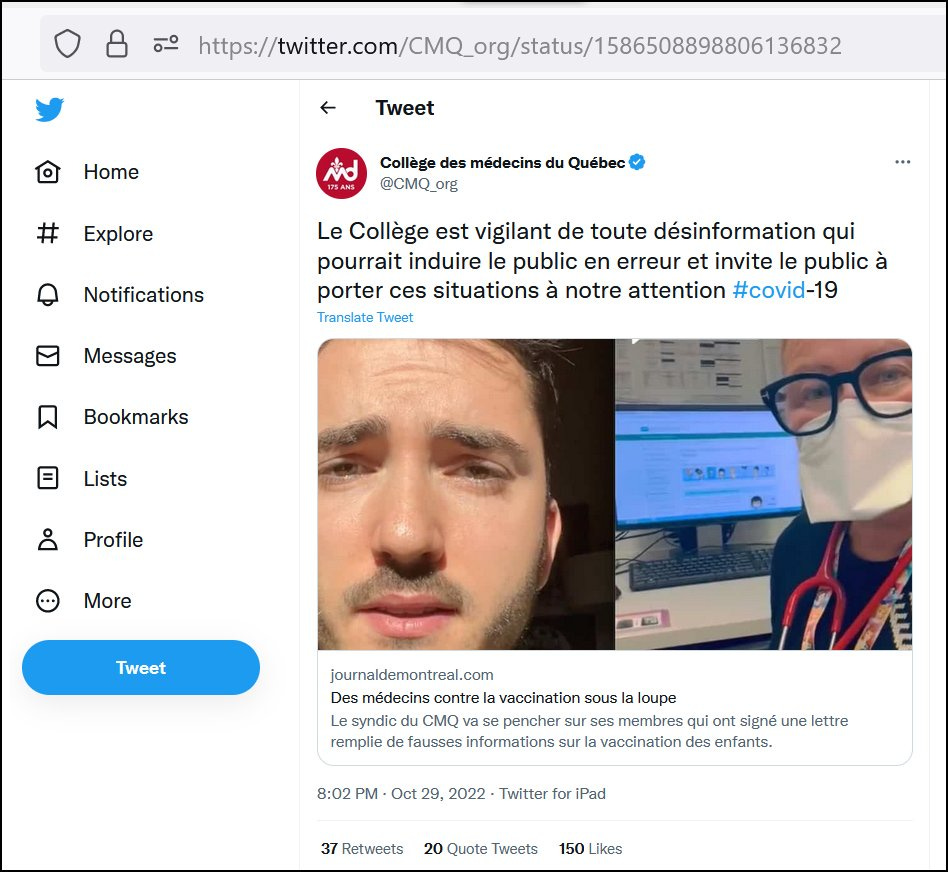


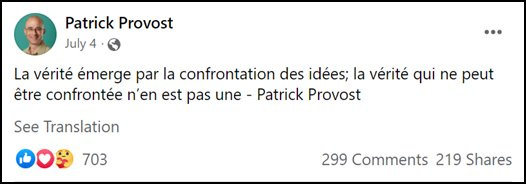

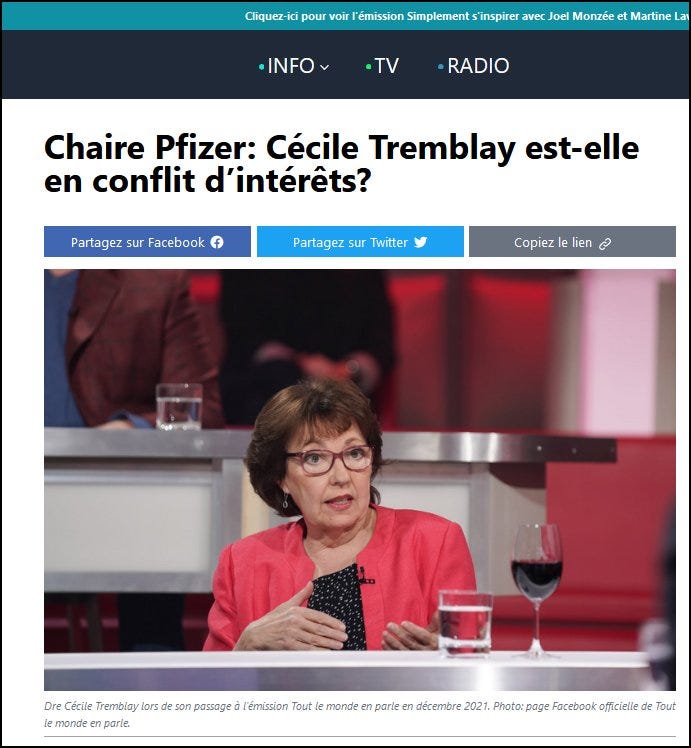

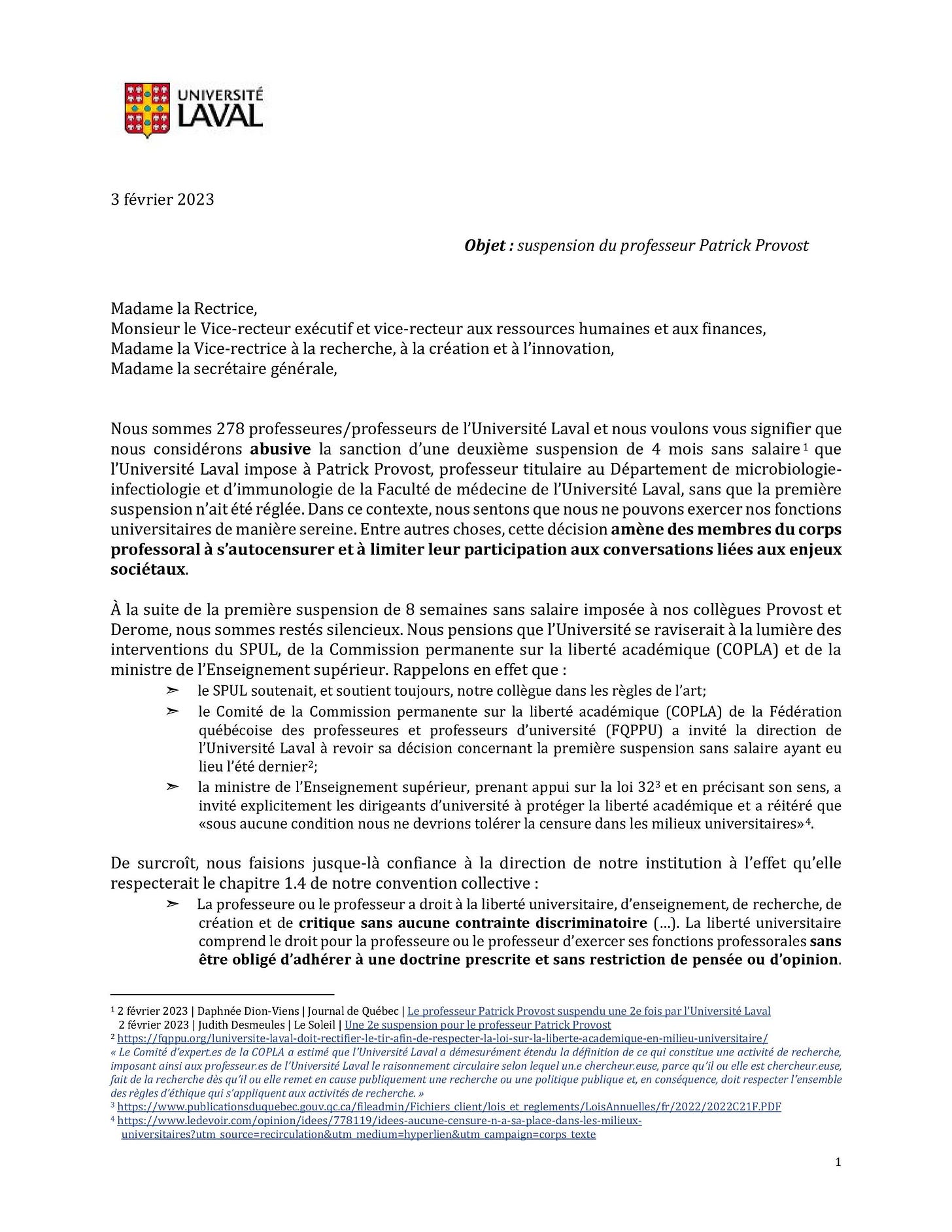



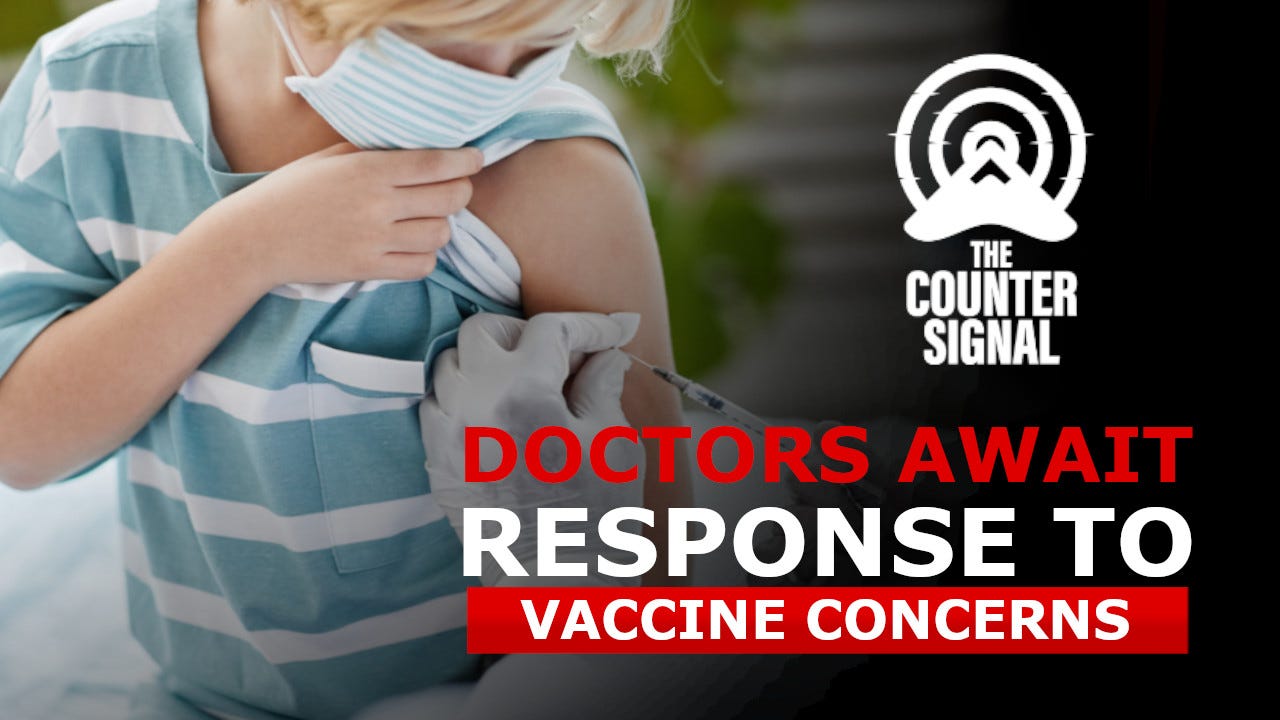
Hi Dan - I saw that you clicked like on my ESG article, and just wanted to drop in and say thanks.
I am also interested in finding writers like yourself to collaborate with - I have developed a huge data base of research and ideas for articles which I will never have enough time to get written so interested in getting people who would like to follow up on some of these ideas.
If you'd like to contact me send me an email on ivanpaton@hotmail.com - and let me know what your focused on and I can shoot you back some ideas.
Ivan
The information war is intensifying.